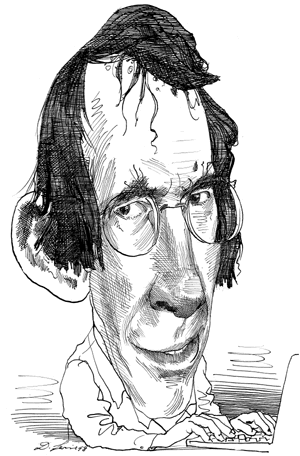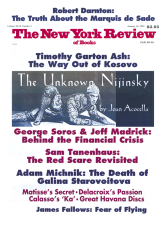Ian McEwan is a prize winner. His novels and stories have won the Somerset Maugham Award and the Whitbread Prize, and have been shortlisted for Britain’s most hyped trophy, the Booker Prize. This year he won it with Amsterdam. When the award was made in October, there were murmurs that it must have been an act of reparation by this year’s Booker judges for their predecessors’ mistake: the 1997 prize should have gone to McEwan for Enduring Love, which was thought to be a much meatier, longer, and more profound novel. Amsterdam is an intricate satirical jeu d’esprit and topical to the point of Tom Wolfeishness. It is also funnier than anything McEwan has written before, though just as lethal.
Death always figures in his work. In his heart-rending (but ultra-cool) first novel, The Cement Garden, a mother dies and her four young children bury her in a box of cement in the basement: their father died some time before, and they realize that if her death becomes known, they will be separated and sent to orphanages. In The Innocent, a couple of lovers accidentally kill the woman’s violent divorced husband in self-defense. McEwan devotes many pages to their methodical dismembering of the body (“There was a glutinous sound which brought him the memory of a jelly eased from its mould”) and the difficulties of its disposal. Reviewing Enduring Love (which opens sensationally with a man killed falling from a balloon) in these pages last April, Rosemary Dinnage remarked that “among the critical praise that festoons his book jackets, the word ‘macabre’ crops up more than once.” But until Amsterdam, McEwan’s macabre has not been merely “grim, gruesome” (OED); not been like, say, Genet’s. There have been hints of the supernatural. His novels are spooky—particularly Enduring Love and The Child in Time, which is, among other things, about second sight.
So what happened when McEwan won this year’s Booker Prize seemed as strange as one of his own plots—as though he himself had second sight, in fact. On the very day it was announced, a ministerial scandal broke in the British press and the subsequent events developed along lines uncannily like the story of Amsterdam. In fact as in fiction, a government minister resigned because of a harmless sexual indiscretion. The real-life minister went home with a stranger he met on Clapham Common, a known homosexual beat. He was robbed at knife-point and blackmailed. He informed the police, the affair became public, and he chose to resign. In Amsterdam, McEwan’s foreign secretary is forced to resign because photographs of him in drag appear on the front page of a national paper. What makes the coincidence even stranger is that as the real-life events in Britain faded from the front page, a story broke about the birth of Siamese twins: it happens in Amsterdam as well.
Julian Garmony, the foreign secretary in Amsterdam, is a bland right-wing monster, a hanger and flogger who wants to keep immigrants and asylum seekers out of Britain. (McEwan usually manages to introduce an element of anti-Thatcherism, most notably in The Child in Time, where each chapter is preceded by an excerpt from a spoof Thatcherite, ultra-disciplinarian “Authorised Childcare Handbook”). There is a danger that Garmony might be the next prime minister. So Vernon Halliday, the editor of a national paper, decides to use the photographs to ruin his career: he convinces himself that this is a noble cause. But his motives are mixed: he needs to raise a falling circulation, and the Garmony scoop would make it zoom.
There is a lot of opposition from the old-guard journalists on the paper, who feel that Vernon has been dragging it down-market since he took over after the previous editor was sacked. They are dismayed at the proposed invasion of Garmony’s privacy. (In Britain at this moment, you couldn’t find more topical subjects than invasion of privacy and the vulgarization of the press.) Vernon is frantic with indecision, and seeks the advice of his oldest friend, Clive Linley: Clive sides with the older journalists. Besides, he points out, publishing the photographs would be a betrayal of the adorable woman who took them. She is called Molly, and the book begins with her funeral. The wife of the millionaire George Lane, a shareholder in Vernon’s paper, she died in her forties of a degenerative disease.
George owns the photographs, is keen to sell them, and urges Vernon to publish them. Molly had had a great many affairs, including twice each with Vernon and Clive, and once with Garmony; she remained on the warmest terms with all three. Sentimental nostalgia for her affects them all. The plot here is pure Feydeau, except for Molly’s horrible death, which is pure McEwan, who is given to dwelling on physical horrors, especially deterioration, decay, decomposition, putrefaction. It is not the only plot, though: Amsterdam is a thriller as well as a farce, with a plot whose extreme convolution and plethora of unlikely coincidences reads as a sendup of the thriller genre.
Advertisement
It is also an ethical duel between Clive and Vernon, neither of whom is ethically motivated at all, though both like to think they are. Clive is a composer of independent means, and his morality is actually the fat-cat fastidiousness of a spoiled, conceited man who thinks he may be a genius. He is currently absorbed in a commission for a “Millennial Symphony” to have its première shortly. As for Vernon, the general view of him is that he does “not fully exist. Within his profession Vernon was revered as a nonentity.” Neither Clive nor Vernon is likable or even charming. Both are hypochondriacs, and thoughts of Molly’s grisly demise bring on suspicious tingling sensations and feelings of numbness in both of them. Without disclosing their disquieting symptoms to each other, they make a suicide pact: each promises that if his friend becomes incapacitated, he will make the necessary arrangements with a euthanasia specialist in Holland.
But their argument about the photographs turns nasty; they fall out, and each seizes a chance to stab the other in the back, with the result that Vernon gets the sack. As for Clive, rage at Vernon’s perfidy destroys his concentration and he fails to get together the finale for his symphony—which therefore later turns out to be a flop. Its première, by a British orchestra, is only a week ahead. The orchestra is currently performing in Holland, so Clive flies to Amsterdam for rehearsals. Vernon follows him, and the suicide pact turns into a reciprocal murder by medical syringe. One isn’t, of course, meant to believe in this far-fetched scenario. Amsterdam is a savage farce about horrible people, whose every motive is flawed—and that goes for the minor characters as well, except the dead Molly. They are all hypocrites, adept at finding ways of living with any bad conscience they might have. The old-guard journalist who overcomes his objections and finally backs Vernon about publishing the photographs is typical of all the rest. After Vernon is fired, “he was heard to say in the canteen that once his misgivings were not listened to, he did his best to be loyal. By Monday they had all remembered their misgivings and how they had all tried to be loyal.” McEwan is a super-sleuth when it comes to digging up bad motivation.
Amsterdam is an indictment of human nature, with special reference to the Sixties generation to which Clive and Vernon belong—and all the other players too (except for the ruthless young journalist who steps into Vernon’s shoes).
Nurtured in the postwar settlement with the state’s own milk and juice, and then sustained by their parents’ tentative, innocent prosperity, to come of age in full employment, new universities, bright paperback books, the Augustan age of rock and roll, affordable ideals. When the ladder crumbled behind them, when the state withdrew her tit and be-came a scold, they were already safe, they consolidated and settled down to forming this and that—taste, opinion, fortunes.
Because Amsterdam is cast as a farce, McEwan can be even more judgmental than usual. Moral judgment is a built-in component of his stories, which often feature a woman whose wisdom and exemplary behavior show up the callousness or just the wetness and confusion of the men. His women are also much better at loving than their partners. McEwan can write about love with a rare combination of delighted surprise and specificity that gives it an unusual sheen; and he is brilliant at writing about children—though when he writes about babies, especially dead, unborn, or aborted ones, the pathos can be excessive.
There is no scope for any of this in Amsterdam, or really for the lyrical evocation of nature that is another of McEwan’s specialties. Perhaps that is why a longish Wordsworthian interlude doesn’t come off. Clive goes to the Lake District to seek inspiration for the finale of his symphony, and his walk in the hills turns out rather tedious—overlong and overloaded with the names of mountains and dales that can’t evoke much for anyone who hasn’t been there. On the other hand, Clive’s compositional problems and tactics are made so clear that one can almost hear the score as well as see it go down on the ruled paper. McEwan knows about composing music: he wrote the words for Michael Berkeley’s oratorio Or Shall We Die? And he enjoys displaying his expertise. In The Innocent it was electronic engineering and tunneling; in The Child in Time, relativity theory; and in Enduring Love, evolutionary genetics, psychiatry, and physics. In Amsterdam one gets not only music but also journalism: the daily hypertension of the editorial meeting.
Advertisement
McEwan is among the most idiosyncratic of British novelists, even if he doesn’t seem interested in experimental writing. His prose is precise and revelatory, and whatever he writes about comes up fresh, luminous, and surprising, like a familiar painting recently cleaned. An example: Clive glimpses an old black woman “folded double” with osteoporosis. If she were just “bent” double, one wouldn’t notice her; “folded” evokes her pathos and makes her visible. She gets only one sentence for her walk-on appearance, but she fulfills her purpose, which is to evoke pathos at that point in the story. The contrast between McEwan’s superclean prose and lay-preacher stance on the one hand, and his steamy, ghoulish, tender, sometimes even mawkish subject matter and moods on the other, make him dangerously attractive and repellent at the same time.
This Issue
January 14, 1999




